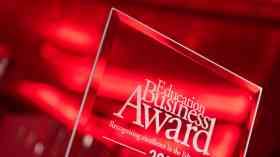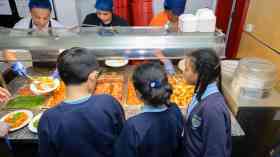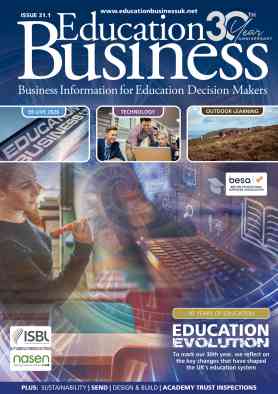Learning with benefits
 The introduction of the new English Baccalaureate (eBac) stemmed from the government’s concern that there had been a “dramatic collapse” in the number of pupils taking GCSEs in traditional academic subjects including English, maths, science, foreign language and humanities. This, in turn, they felt would increasingly affect the UK’s global economic position in the future.
The introduction of the new English Baccalaureate (eBac) stemmed from the government’s concern that there had been a “dramatic collapse” in the number of pupils taking GCSEs in traditional academic subjects including English, maths, science, foreign language and humanities. This, in turn, they felt would increasingly affect the UK’s global economic position in the future.
The decision came at the time of the announcement of the results of the PISA ranking, which emphasised the need for a review of the core subjects in England. This highly anticipated annual ‘Programme for International Student Assessment (PISA)’ showed that once again the UK had slipped further down the world ranking in maths, reading and science to 25th position. And it is certainly true that a ‘baccalaureate’ system is operated by many European and Asian countries that are now positioned above the UK in these international league tables.
Speaking at the Education World Forum in January 2011, Andreas Shleicher, head of the PISA programme at OECD said that the picture for the UK was “stagnant at best”. “Many other countries have seen quite significant improvement,” he added.
The advantages
The new English Baccalaureate has its advantages for the Department for Education. As stated by the government, it will put an end to schools aiming to maintain their league table status by simply putting their students through ‘non-academic’ qualifications such as the intermediate GNVQ in ICT, which is measured to be the equivalent of four good GCSE passes, despite only requiring the teaching time of the maths GCSE.
It is also a straightforward signal to head teachers that this government wants every child to have access to a balanced and rigorous curriculum. Employers expect good communication skills and a standard of maths and science and the Confederation of British Industry’s (CBI) has continually stressed the need for change if we are the become a more economically successful society.
However, there are many reservations.
Objections
The majority of objections were based on the speed with which this new umbrella qualification has been introduced. School performance in the autumn is already going to be measured by the number of children who attain the new certificate although it was introduced after they took the exams. This is therefore perceived as a retrospective assessment move.
Naturally many feel this is an unfair measure of success, with teachers suggesting the government has moved the goal posts without warning. Many young people have studied hard for a range of qualifications but now will find it impossible to reach the standard of the eBac simply because they made their choice a few years ago.
It also causes many management issues for secondary schools in how they organise their curriculum, teaching day and assessment regime. In fact many secondary leaders are saying that it will skew the way schools work.
In a resent focus group at BESA, secondary leaders told us that they were having to reconsider what was being taught and how they could manage these core subjects – often without key staff or time or space in school. The status of subjects in school has now been changed. This means that the importance of other subjects has declined – in terms of value and number of lessons. For the good of their students and their future they will have to do this – even though they know it is not the best thing for student performance in all cases.
Also, because pupil numbers were going to be a big issue in the future (and so funding) schools would be looking for their unique selling point to attract parents and students (especially if they did not have to follow a particular specialism any longer). Heads would need to demonstrate the value of their school as a marketing exercise, and eBac results would be a major factor.
Schools are also questioning the value now placed on the subjects not included in the Baccalaureate. The coalition government positioned it as offering “a broad, rounded curriculum” but what about students who have a proficiency in art and the creative subjects – and more importantly vocational and technical subjects? Will they be seen as less qualified? Equally, students who have selected to study religious education (not one of the humanities on the list) will now be seen to be less successful than those studying a language or even geography.
Outcomes
The feeling at our recent focus group was that although the government talks about local choice and autonomy, these measures will all be about outcomes (linked to the new Ofsted framework). The retro-tables linked to the eBac will be key to curriculum change. “Schools are being forced to play a different game,” one leader commented. iGCSEs are changing the nature of teaching as well, with no coursework and the perception that “they are easier to pass”.
Despite the government’s view that it offers a broad curriculum, what all teachers will stress is that education surely is about being able to live a constructive fulfilled life and contribute positively to society. It is not just about getting students to university. The fact that there has been a 2,300 per cent increase in the number of students taking vocational qualifications since 2004 should not solely be attributed to students and schools taking the easy option in maintaining their position in the league tables. It is more likely to be a sign of the fact that a significant number of students recognise what they are really good at and what will help them to become independent learners.
The language challenge
This focus on academic subjects is also clearly going to disadvantage schools in certain areas. Students with English as a second language is a common aspect of many schools particularly those located in urban areas. Therefore being measured by the number of Baccalaureate passes including English is often unreasonable and can only lead to perceived failure. Although, in addition to the three core elements of the baccalaureate, students can select their first language, which would normally be their mother tongue.
This brings us on to the next obstacle provided by the Baccalaureate. Secondary schools will have to, if selected, be able to provide GCSE level teaching for any number of languages – Mandarin, Hindi-Urdu, Bengali, Russian or Japanese to name just a few.
A similar challenge was presented to primary schools last year, when the previous government made it a part of the national curriculum for every child from the age of seven to 14 to learn a modern foreign language (MFL). Few primary schools employ qualified language teachers, so being able to provide an acceptable level of teaching was questionable. Many provide access to a language however through creative means – ICT programmes, language clubs, national celebrations.
Taking this one step further, we should ask the question whether modern foreign languages will have to continue to be taught at primary level if we are to achieve a good standard at secondary.
One BESA member, Rising Stars, creators of award-winning books, teaching resources and software including the Euro Stars Primary French programme, offers schools a simple way to incorporate MFL into the curriculum, without the need for specialist teachers.
Managing director Andrea Carr comments; “We appreciate that primary teachers are not always comfortable or able to teach modern foreign languages. Euro Stars has been designed by teachers to meet their key concerns, including providing comprehensive support for pronunciation, audio by native French speakers and being fully linked to the QCA Scheme of Work for MFL French.”
We all appreciate the government’s view of a need for higher standards in our education system, we all want the UK to regain our leading position in the PISA ranking and we all respect the need for core skills in everyone’s life, regardless of their future career but there are clearly aspects of the new Baccalaureate that need refining. We also all keenly await the details of the primary curriculum review to understand how primary school’s curriculum will be adjusted to support students as they move towards the new English Baccalaureate.
About BESA
BESA, the British Educational Suppliers Association, is the trade association representing over 300 educational suppliers in the UK, including manufacturers and distributors of equipment, materials, books, consumables, furniture, technology, ICT hardware and digital-content related services to the education market.
With 75 years of experience, BESA offers unparalleled support, research, events and advice on both UK and International markets, and the future of the education supplies industry. BESA is focused on promoting and providing support and advice to their members, the industry and to schools.
BESA has a Code of Practice to which all members must adhere, along with a stringent membership process, both of which assure buyers of a high standard of quality in both product and customer service.
For more information
www.besa.org.uk
Latest News
29/01/2026 - 10:37
The Education Business Awards recognise the leadership, innovation, operational decisions and strategic planning that help schools run more effectively and deliver better environments for both staff and pupils.
29/01/2026 - 10:26
The Education and Work and Pensions Committees have launched a joint inquiry investigating how the Government’s new Child Poverty Strategy, announced last month, can meet its aims.
29/01/2026 - 09:23
Charity School Food Matters has released learnings from its school food improvement programme, Nourish, and has formed a roadmap to success for school food policy.
28/01/2026 - 09:57
Multi-academy trusts are increasingly turning to artificial intelligence to support teaching, learning and school management, but evidence of its impact remains limited, according to new research from the Education Policy Institute (EPI).
27/01/2026 - 10:04
The government is running a tender for industry to co-create AI tutoring tools with teachers, with the goal of bringing these tools to a similar level of quality of personalised one to one support.







